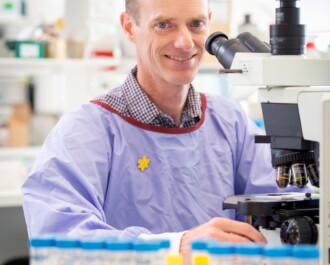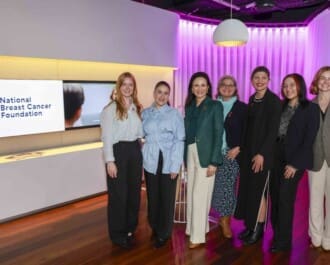
Targeted therapies are drugs which block the function of certain specific molecules involved in the development, growth and spread of cancer. In breast cancer, one of the most well-known targeted therapy drugs is Herceptin (trastuzumab), which is used to treat HER2-positive breast cancer.
Unfortunately, patient responses to targeted therapies can vary considerably. Some women will experience substantial benefit from the drugs, others show no response, and some even experience severe adverse reactions. At the current time, there is little evidence to help clinicians determine who will respond best to targeted therapies.
Dr Ashley Hopkins (Flinders University, South Australia) is a qualified pharmacist and NBCF-funded researcher who uses ‘big data’ and his knowledge of medicines to develop prediction models of likely treatment success. His work uses the large amount of information gathered in clinical trials by pharmaceutical companies to search for predictors of both good and bad outcomes.

Dr Ashley Hopkins
Recently, Dr Hopkins led three large studies* that have identified a number of predictors that were associated with likely treatment outcomes in HER2-positive advanced breast cancer. These predictors range from laboratory tests, such as abnormal levels of cancer-related enzymes or white blood cell count, through to the use of other drugs, including steroids. Dr Hopkins found that women with cancer that had spread to other parts of the body were more likely to respond poorly to anti-HER2 targeted therapies. The team also found that more general measures of quality of life, such as daily living abilities, could help predict the outcome of treatments.
Dr Hopkins says that analysis of large data sets can help patients and clinicians to make informed decisions about the best treatment options for women with breast cancer.
“This type of information can help guide treatment decisions that may improve response rates and decrease toxicity to specific therapies,” he said. “The data may also provide an indicator of when to use alternative therapies or focus on palliative care.”
The work of Dr Hopkins and his fellow researchers is made possible by patient advocacy of the importance of transparent sharing of data from clinical trials conducted by drug-companies. Transparent sharing of data by drug-companies makes it possible for oncologist and the community to have confidence in prescribing medicines and it makes it possible for data scientists to identify predictors of health outcomes. Dr Hopkins team is now sharing their findings with oncologists so that they can make more informed decisions about the drugs they are using, ultimately allowing patients to have optimal outcomes from treatment.
More News Articles
View all News


